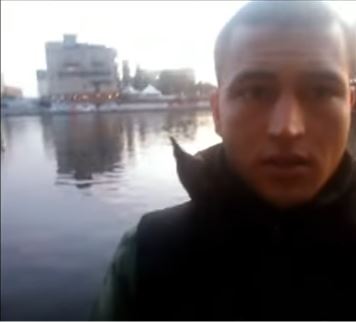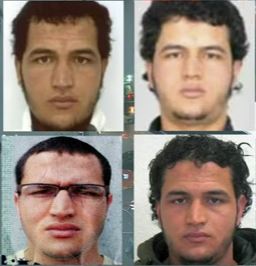
The Guardian / UK: Fingerprints found inside the cabin of the truck that ploughed into a Berlin Christmas market match those of the fugitive suspect Anis Amri, Germany’s federal prosecutor’s office confirmed on Thursday night.
Spokeswoman Frauke Köhler said that fingerprints of the Tunisian, who turned 24 on Thursday, had been discovered on the outside of the Polish-registered articulated truck, as well as the driver’s door and the vertical support beam in the vehicle’s window area.Speaking at a joint press conference with the German chancellor, Angela Merkel, the interior minister, Thomas de Maizière, said that the fingerprints and other evidence made it “highly probable” that the Tunisian suspect was the perpetrator of Monday’s terror attack.
Merkel told the press conference that she hoped the suspect would be caught “soon” and that she had been heartened by the public reaction to the tragedy: “In the last few days I have been very proud of how level-headed the reaction of the majority of people to this situation has been.”
The findings came as Amri’s brother said he could not believe that his sibling would have carried out the atrocity. “There was no sign he had been radicalised. I’m sure he can’t have done this, that’s not why he emigrated. May God reveal the truth,” Abdelkader Amri told a reporter from Agence France-Presse outside his home in the town of Oueslatia, about 30 miles (50km) from Kairouan in eastern Tunisia.
“If my brother is behind the attack, I say to him: ‘You dishonour us,’” Abdelkader Amri said.
The suspect, meanwhile, remained on the run, with German police left empty-handed after a day of raids around the country. In Berlin’s Moabit district, a commando unit deployed flash grenades to storm a Salafist meeting point that had been frequented by Amri but left without making arrests.
Farther south, in the city of Heilbronn, police searched a coach travelling from Luxembourg to Bosnia but later said the operation had been triggered by a case of mistaken identity. Overnight raids were conducted on apartments in Berlin and Dortmund, but reports of the arrest of Amri’s associates were unfounded.
With a man feared armed and dangerous still on the loose three days after Monday’s deadly attack, German politicians rounded on the country’s security services, with one politician accusing intelligence agencies of “catastrophic mistakes”. “What we are dealing with is a failure of government that cannot be tolerated,” the opposition politician Christian Lindner of the Free Democrats told the German news agency DPA.
A deputy chairman of Merkel’s Christian Democratic party accused intelligence agencies of incompetence, saying Wednesday’s reports on security failures had left him “shocked”.
Having first registered in the North-Rhine Westphalia region upon entering Germany in July 2015, the suspect had been identified as a security risk and put under close surveillance, with investigators even aware of his willingness to carry out a suicide attack. But a surveillance operation was stopped in September and Amri dropped off intelligence agencies’ radar in November, possibly due to a mix-up between regional authorities.
Criticising the work of intelligence agencies in North-Rhine Westphalia, the CDU deputy chair, Armin Laschet, said: “So the attitude seems to be: ‘He’s gone to Berlin, so the case is closed for us here. Now it’s Berlin’s turn.’”
Laschet called for better coordination between security agencies across Germany’s federal state system.
The delay in identifying Amri as the driver of the truck also continued to raise eyebrows, after police had wrongly arrested a Pakistani asylum seeker in the direct aftermath of the attack.
A tweet by the founder of the nationalist, anti-Islam movement Pegida had caused speculation as to whether police already knew the correct identity of the attacker on Monday night. Merely two hours after the attack, Lutz Bachmann had tweeted that the perpetrator was a Tunisian Muslim, citing an “internal source” with Berlin’s police force.
But police on Thursday insisted that they had not obtained the wallet with the documents that identified Amri until Tuesday afternoon, stating that the truck had had to be moved from the site of the accident and searched by sniffer dogs before it could be properly scrutinised by police officers.
Anis Amri had fled Tunisia after the 2011 revolution, registering on the island of Lampedusa in February that year. According to Italian media, he started to show signs of aggressive behaviour while attending a centre for minors in Catania, reportedly having tried to set his school on fire. In October 2011, Amri was charged for robbery, arson and personal threats and sentenced to four years in jail.
He reportedly spent time in prisons in Catania and then Palermo.
During his time in prison his “aggressive behaviour’’ was noted by guards, an official told the Guardian. After his release, Amri was sent to an immigration centre at Caltanissetta, from where he was due to be deported back to Tunisia. Since authorities in Tunisia refused to recognise Amri as a Tunisian citizen, however, the deportation did not take place. In the summer of 2015 Anis left Italy for Germany, first registering in the town of Emmerich am Rhine.
In April 2016 Amri applied for asylum at a refugee shelter in Kleve, also in North Rhine-Westphalia, but his application was rejected only weeks later. Amri had pretended to be an Egyptian national, but German officials had noticed that he had already registered elsewhere under different names. He was therefore due to be deported back to Tunisia.
But as in Italy, authorities in his home country did not recognise him as one of their citizens. On 30 July, Amri was caught in a routine check of a coach in Friedrichshafen and moved to a prison in Ravensburg after police noticed that he was due to be deported and carrying fake Italian ID documents. Two days later the Tunisian was released again, most likely because of the missing documents from Tunisia.





